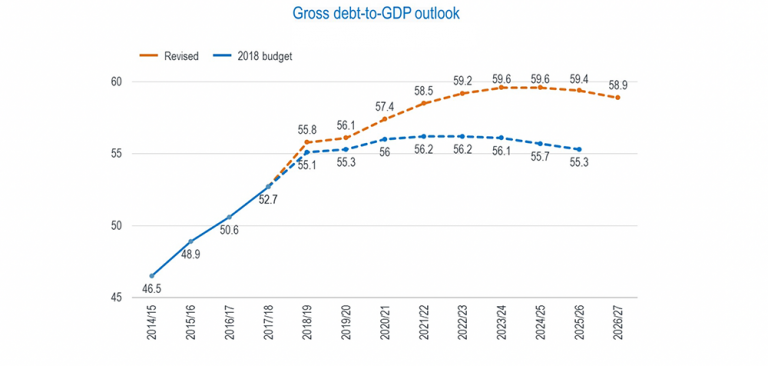Stay abreast of COVID-19 information and developments here
Provided by the South African National Department of Health
Mini budget:
reality catches up with hope
Our new Finance Minister, Tito Mboweni, certainly delivered his maiden Medium-Term Budget Policy Statement (MTBPS) in a statesman-like fashion last week. He was honest to a fault, not beating around the bush in setting out the fiscal predicament of our government. The macro numbers – in particular fiscal slippage and our country’s debt burden – remain of grave concern, however, and reflect the reality of an economy stuck in a low-growth trap.
The macro-economic backdrop against which Minister Mboweni had to present his mini budget to Parliament didn’t give him much room to manoeuvre. In the prevailing economic conditions, revenue was sure to be under pressure. Our new Finance Minister also inherited an alarmingly high budget deficit, certainly in international terms. So there wasn’t too much he could do under the circumstances except rearrange the deck chairs.
Most analysts didn’t anticipate too much fiscal slippage, which simply refers to the difference between the expected and the actual deficit. There was also some expectation that further detail on President Cyril Ramaphosa’s R50 billion infrastructure programme might be revealed, with funds being channelled into areas that could create capacity to grow the economy.
The mini budget disappointed in three main areas:
Sanlam Private Wealth manages a comprehensive range of multi-asset (balanced) and equity portfolios across different risk categories.
Our team of world-class professionals can design a personalised offshore investment strategy to help diversify your portfolio.
Our customised Shariah portfolios combine our investment expertise with the wisdom of an independent Shariah board comprising senior Ulama.
We collaborate with third-party providers to offer collective investments, private equity, hedge funds and structured products.

There are somewhat extenuating circumstances for this state of affairs – in the form of the VAT refund liability to the tune of R11 billion, which Minister Mboweni has committed to repaying to the business sector. But in the end, it remains a numbers game and both the bond and currency markets reacted negatively after the mini budget was tabled.
Sanlam Private Wealth manages a comprehensive range of multi-asset (balanced) and equity portfolios across different risk categories.
Our team of world-class professionals can design a personalised offshore investment strategy to help diversify your portfolio.
Our customised Shariah portfolios combine our investment expertise with the wisdom of an independent Shariah board comprising senior Ulama.
We collaborate with third-party providers to offer collective investments, private equity, hedge funds and structured products.

As this graph shows, the prediction in February was that our debt-to-GDP ratio would flatten out at around 56.2% by 2022 and then roll over towards 55.3% heading into 2025. In Minister Mboweni’s new forecast, gross national debt is now projected to peak at 59.6% – and only in 2023 – before slowly edging off. While he is to be commended for his honesty in presenting what’s probably a more realistic scenario than his predecessors, the new numbers aren’t going to please the rating agencies waiting in the wings.
We also noted that our Finance Minister didn’t provide much detail around how government intends to tackle financial discipline within state-owned enterprises (SOEs). A fair amount has been allocated to SAA (R5 billion), SA Express (R1.2 billion), the SA Post Office (R2.9 billion) and SANRAL (R5.8 billion), with promises that this will be the last funding of SAA. We have, of course, heard this before.
The aspects of the mini budget that we did like, include:
What does all this mean for investors? The financial markets weren’t too positive about the mini budget, as evidenced by the negative reaction of our currency. The markets are clearly concerned about the potential response of rating agencies to especially the higher gross debt levels. In our view, there’s now an increased likelihood that Moody’s – the sole agency that hasn’t yet downgraded South Africa’s sovereign debt to sub-investment grade – may respond by doing so, or at the least changing the outlook to negative.
Bond yields also came under pressure in the wake of Minister Mboweni’s speech. As a result of the increased deficit, Treasury will now need to fund an additional R175 billion in terms of bond issuance, which will of course push down bond prices.
The mini budget is in the main good news for equity markets, however. The corporate sector will welcome the envisaged overdue VAT refunds. The VAT exemptions on certain items from April next year should also provide a boost to the food and other producers concerned.
Favourable for retail equities is the fact that Treasury hasn’t budgeted for increased taxes. And the proposed spending reallocation is sure to benefit certain segments of the private sector, such as the construction industry.
In a nutshell, we believe that the disappointments in the mini budget are fairly evenly balanced out by the positives, given the weak macro-economic backdrop. We remain very concerned about South Africa’s distressing gross national debt-to-GDP ratio, however. As always, we’ll structure portfolios to protect our clients’ investments against risks associated with this and other macro-economic and fiscal challenges.
Sanlam Private Wealth manages a comprehensive range of multi-asset (balanced) and equity portfolios across different risk categories.
Our team of world-class professionals can design a personalised offshore investment strategy to help diversify your portfolio.
Our customised Shariah portfolios combine our investment expertise with the wisdom of an independent Shariah board comprising senior Ulama.
We collaborate with third-party providers to offer collective investments, private equity, hedge funds and structured products.
We provide daily reporting of trades, monthly portfolio evaluations and annual tax reports to clients.
Riaan Gerber has spent 16 years in Investment Management.

Have a question for Riaan?
South Africa
South Africa Home Sanlam Investments Sanlam Private Wealth Glacier by Sanlam Sanlam BlueStarRest of Africa
Sanlam Namibia Sanlam Mozambique Sanlam Tanzania Sanlam Uganda Sanlam Swaziland Sanlam Kenya Sanlam Zambia Sanlam Private Wealth MauritiusGlobal
Global Investment SolutionsCopyright 2019 | All Rights Reserved by Sanlam Private Wealth | Terms of Use | Privacy Policy | Financial Advisory and Intermediary Services Act (FAIS) | Principles and Practices of Financial Management (PPFM). | Promotion of Access to Information Act (PAIA) | Conflicts of Interest Policy | Privacy Statement
Sanlam Private Wealth (Pty) Ltd, registration number 2000/023234/07, is a licensed Financial Services Provider (FSP 37473), a registered Credit Provider (NCRCP1867) and a member of the Johannesburg Stock Exchange (‘SPW’).
MANDATORY DISCLOSURE
All reasonable steps have been taken to ensure that the information on this website is accurate. The information does not constitute financial advice as contemplated in terms of FAIS. Professional financial advice should always be sought before making an investment decision.
INVESTMENT PORTFOLIOS
Participation in Sanlam Private Wealth Portfolios is a medium to long-term investment. The value of portfolios is subject to fluctuation and past performance is not a guide to future performance. Calculations are based on a lump sum investment with gross income reinvested on the ex-dividend date. The net of fee calculation assumes a 1.15% annual management charge and total trading costs of 1% (both inclusive of VAT) on the actual portfolio turnover. Actual investment performance will differ based on the fees applicable, the actual investment date and the date of reinvestment of income. A schedule of fees and maximum commissions is available upon request.
COLLECTIVE INVESTMENT SCHEMES
The Sanlam Group is a full member of the Association for Savings and Investment SA. Collective investment schemes are generally medium to long-term investments. Past performance is not a guide to future performance, and the value of investments / units / unit trusts may go down as well as up. A schedule of fees and charges and maximum commissions is available on request from the manager, Sanlam Collective Investments (RF) Pty Ltd, a registered and approved manager in collective investment schemes in securities (‘Manager’).
Collective investments are traded at ruling prices and can engage in borrowing and scrip lending. The manager does not provide any guarantee either with respect to the capital or the return of a portfolio. Collective investments are calculated on a net asset value basis, which is the total market value of all assets in a portfolio including any income accruals and less any deductible expenses such as audit fees, brokerage and service fees. Actual investment performance of a portfolio and an investor will differ depending on the initial fees applicable, the actual investment date, date of reinvestment of income and dividend withholding tax. Forward pricing is used.
The performance of portfolios depend on the underlying assets and variable market factors. Performance is based on NAV to NAV calculations with income reinvestments done on the ex-dividend date. Portfolios may invest in other unit trusts which levy their own fees and may result is a higher fee structure for Sanlam Private Wealth’s portfolios.
All portfolio options presented are approved collective investment schemes in terms of Collective Investment Schemes Control Act, No. 45 of 2002. Funds may from time to time invest in foreign countries and may have risks regarding liquidity, the repatriation of funds, political and macroeconomic situations, foreign exchange, tax, settlement, and the availability of information. The manager may close any portfolio to new investors in order to ensure efficient management according to applicable mandates.
The management of portfolios may be outsourced to financial services providers authorised in terms of FAIS.
TREATING CUSTOMERS FAIRLY (TCF)
As a business, Sanlam Private Wealth is committed to the principles of TCF, practicing a specific business philosophy that is based on client-centricity and treating customers fairly. Clients can be confident that TCF is central to what Sanlam Private Wealth does and can be reassured that Sanlam Private Wealth has a holistic wealth management product offering that is tailored to clients’ needs, and service that is of a professional standard.